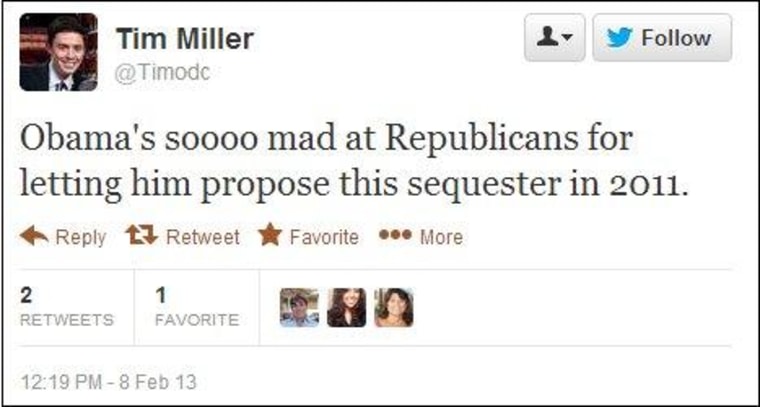When it comes to the looming, automatic sequestration cuts, there seem to be two broader debates happening simultaneously. The first, more important question deals with what's going to happen with the policy itself, and the scope of the damage it could do to the economy, the military, and the country.
The second question is a little pettier: who came up with this awful idea in the first place? A Republican National Committee spokesperson, echoing his party's favorite new talking point, insists this is all President Obama's fault.
Tim Miller obviously isn't the only one making this argument. On the contrary, every speech, interview, and press release I've seen from GOP officials in recent weeks includes an obligatory reference to Obama having come up with the sequester.
I certainly understand the point of the argument. If sequestration kicks in three weeks from now, it's likely to do serious harm. Republicans don't want to be blamed, so they're laying the groundwork now, trying to convince the public now that the dangerous policy wasn't their idea. If the deep, automatic cuts hurt the military during a war and pushes the economy closer to a recession, it's in the GOP's interest to start avoiding responsibility now.
Does the GOP have a point on this? Was the policy actually Obama's idea? No. The argument is not only wrong, it's dependent on the entire political world having a very short memory.
Since this has become such an important element of the larger fight, let's take a minute to set the record straight.
In 2011, for the first time in American history, the entirety of the congressional Republican caucus held the debt ceiling hostage. GOP leaders presented the White House with a non-negotiable ransom note: give Republicans over $2 trillion in debt reduction or GOP lawmakers would crash the economy on purpose.
Left with no choice, Obama agreed to negotiate, and accepted over $1 trillion in spending cuts, in exchange for literally no revenue at all. Republicans said this was insufficient, and demanded more than $1 trillion in additional savings -- and if the president refused, they'd crash the economy on purpose.
Ultimately, policymakers agreed they needed more time to negotiate additional debt-reduction measures, so they created a mechanism: a "super-committee" that would work on a bipartisan deal. That, of course, failed, when the panel's GOP members refused to compromise.
But policymakers, assuming the super-committee would probably not work out, had a back-up plan widely referred to as "the sequester." The idea was to force both sides to the negotiating table -- a sword of Damocles hanging over Washington's head that would be so severe, Democrats and Republicans would have a strong incentive to strike a deal to avoid the drastic consequences.
Both sides put some skin in the game: Democrats would be forced to swallow over $500 billion in deep domestic cuts, while Republicans would be forced to swallow over $500 billion in deep cuts to military spending during a war. (Originally, the White House asked that Republicans face a threat of automatic tax increases, but Republicans refused -- even hypothetical tax increases were deemed outrageous -- so they settled on deep Defense cuts instead.)
At the time, House Speaker John Boehner (R-Ohio) said the deal gave him "98 percent" of what he wanted. Did Boehner complain at the time about Obama forcing him to accept a sequester idea the Speaker found outrageous? He did not. Not even a little.
Republicans now want Americans to believe this was all Obama's fault. Let's consider the evidence:
1. Republicans created the debt-ceiling crisis.
2. Republicans wrote the ransom note and named their price.
3. Republicans endorsed, accepted, and voted for this plan, saying they'd accept the consequences.
and 4. Republicans now refuse to compromise (again) to deal with the mess they created.
So we're supposed to believe this is Obama's fault? That's only true if you ignore literally every detail and pretend reality has no meaning.
Let's make this plain: the sequester is a key part of the ransom the GOP settled for during the debt-ceiling crisis they created. It's a little late to pass the buck now.
That said, if Republicans don't like the sequester, they have a terrific option available to them: they can cancel it and end this stupidity once and for all.
